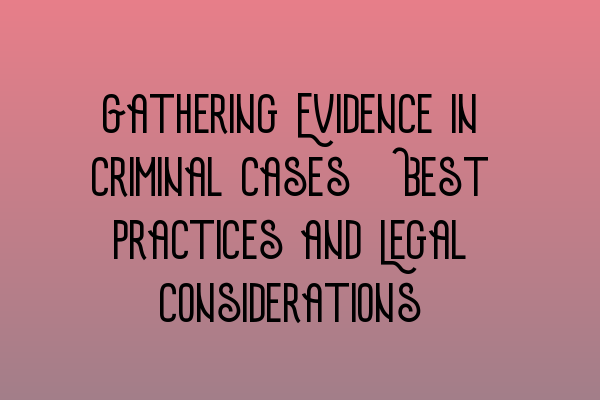Gathering Evidence in Criminal Cases: Best Practices and Legal Considerations
Welcome to the SQE Criminal Law & Practice Law UK blog! In this post, we will explore the importance of gathering evidence in criminal cases, discuss best practices, and highlight key legal considerations. As a criminal law practitioner, it is crucial to understand the significance of evidence and how it can impact a case outcome.
The Role of Evidence in Criminal Cases
Evidence plays a vital role in criminal cases as it helps establish the facts and support the arguments presented by both the prosecution and the defense. It enables the court to determine the guilt or innocence of the accused beyond a reasonable doubt.
When gathering evidence, it is essential to consider both direct and circumstantial evidence. Direct evidence includes eyewitness testimonies, confessions, or scientific evidence such as DNA analysis. On the other hand, circumstantial evidence relies on inferences to draw conclusions, such as a suspect’s behavior or motive.
Best Practices for Gathering Evidence
To ensure the integrity and admissibility of evidence, criminal law practitioners should follow these best practices:
1. Identify and Preserve Evidence Early
It is crucial to identify and preserve evidence as early as possible to prevent tampering or alteration. This includes taking photographs, gathering physical evidence, or securing digital evidence such as emails or social media posts. By acting swiftly, you can strengthen your case and prevent crucial evidence from being lost.
2. Conduct Thorough Witness Interviews
Witness testimonies can significantly impact the outcome of a criminal case. When conducting witness interviews, it is essential to ask open-ended questions, actively listen, and document their statements accurately. Additionally, consider verifying their credibility through background checks or corroborating evidence.
3. Engage Expert Witnesses
Expert witnesses bring specialized knowledge and expertise to your case. Whether it’s a forensic scientist, a medical professional, or a financial expert, their testimony can provide invaluable insights and strengthen your argument. Make sure to qualify and prepare them thoroughly before presenting their evidence in court.
4. Adhere to Legal and Ethical Standards
When gathering evidence, it is crucial to adhere to legal and ethical standards. Avoid using illegal methods or obtaining evidence unlawfully, as this can jeopardize your case and potentially lead to professional misconduct allegations. Familiarize yourself with the rules of evidence and ensure all procedures are conducted lawfully.
Legal Considerations when Gathering Evidence
When gathering evidence, there are several legal considerations to keep in mind:
1. Chain of Custody
The chain of custody refers to the documentation of the handling, transfer, and storage of evidence. It is essential to maintain a clear and unbroken chain of custody to ensure the authenticity and reliability of evidence. Any gaps in the chain of custody could raise doubts about the evidence’s integrity.
2. Search and Seizure
When conducting searches and seizures, law enforcement must adhere to constitutional rights and legal procedures. Understanding the Fourth Amendment and relevant case law is crucial to challenging any unconstitutional searches or seizures. Stay informed about recent court decisions that may impact search and seizure practices.
3. Hearsay
Hearsay refers to statements made outside of court that are offered for the truth of the matter asserted. In general, hearsay is not admissible as evidence unless it falls within a recognized exception. Understanding the rules of hearsay and the exceptions can help you effectively argue for or against the admissibility of certain statements.
As criminal law practitioners, we must stay updated with the latest legal developments, rules, and procedures. Continuous professional development and staying up-to-date with SQE 1 and SQE 2 preparation courses are essential for a successful career in criminal law.
For SQE 1 Practice Exam Questions, SQE 1 Practice Mocks FLK1 FLK2, SQE 2 Preparation Courses, SQE 1 Preparation Courses, and SRA SQE Exam Dates, be sure to visit the related articles on our website.
Thank you for reading! We hope this post has provided valuable insights into gathering evidence in criminal cases.
